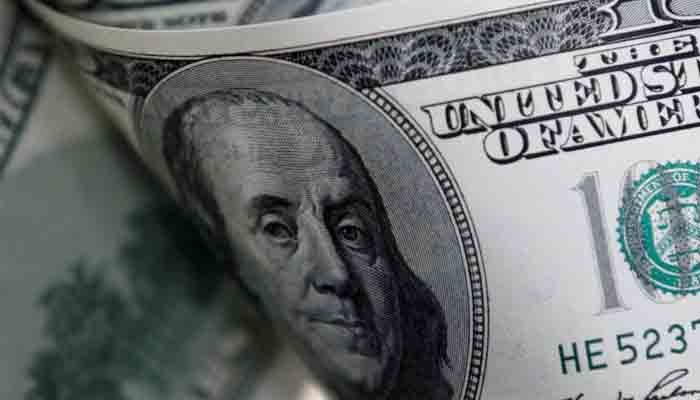SBP forex reserves fall by $2.915bn in a week
Pakistan remains dollar-starved due to heavy reliance on outside for its energy needs, which make up 25 percent of its import bill
KARACHI: The country’s foreign currency reserves are falling fast, hitting the lowest level since end of fiscal year 2020-2021 as the country repaid external debt, including a major syndicated loan facility from China, central bank data showed on Thursday.
Foreign reserves fell to $18.554 billion during the week ended March 25. State Bank of Pakistan (SBP) reserves decreased by $2.915 billion to stand at $12.047 billion, lowest since October 9, 2020.
However, reserves held by commercial banks increased to $6.507 billion, up $30 million during the week ended March 25. Total reserves last week ended March 18 stood at $21.44 billion, while in February 2022 the reserves were at $22.638 billion, the SBP data showed.
Former finance minister Miftah Ismail said “just in March, the SBP reserves have decreased by $4.2 billion”. The SBP reserves were at their lowest in 2018-19 at $7.285 billion, whereas commercial banks’ holdings were their lowest at $5,258 in 2016-17.
Analyst Fahad Rauf of Ismail Iqbal Securities said the SBP reserves plunge by $2.9 billion week-on-week. “Apparently $2.2 billion is the repayment of a Chinese loan, which will be rolled over. Even after excluding it, reserves are down $700 million. The shock absorber (PKR) would melt at this pace.”
Analysts said the methods adopted by the present government to maintain foreign reserves “include heavy reliance on loans borrowed from friendly countries and multilateral financial institutions”.
Out of the approximately $21 billion in outstanding official loans, including commercial, bilateral and safe deposits, China has agreed in principle to grant a fresh rollover of $2.5 billion in commercial loans to Pakistan for one year.
Beijing has already granted rollover of $2 billion loan amount in the recent past, bringing total granted rollover to approximately $4.5 billion to help Islamabad manage its external sector vulnerabilities.
“However, regardless of the no-confidence motion, Pakistan was likely headed to an acute balance of payment crisis as foreign exchange reserves have been depleting at an increasingly alarming rate,” an analyst said.
“In this situation, China’s roll over facility would ease some pressure on the country’s reserves.” China has also assured Islamabad of provision of diesel in the wake of shortages at international level.
Pakistan remains dollar-starved due to heavy reliance on outside for its energy needs, which make up 25 percent of its import bill. With the continuing Russia-Ukraine war, prices of international crude oil have remained on the higher side, increasing Pakistan’s import bill, which likely widen the current account deficit.
In February, Pakistan’s current account deficit narrowed more than expected as close to record high exports and sharp decline in imports pushed the numbers to their lowest this fiscal year.
-
 'A Very Special Visitor' Meets Queen Camilla At Clarence House
'A Very Special Visitor' Meets Queen Camilla At Clarence House -
 Jodie Turner Smith Shares One Strict Rule She Follows As A Mom
Jodie Turner Smith Shares One Strict Rule She Follows As A Mom -
 Hailey Bieber Reveals KEY To Balancing Motherhood With Career
Hailey Bieber Reveals KEY To Balancing Motherhood With Career -
 Photo Of Jay-Z, Other Prominent Figures With Jeffrey Epstein Proven To Be Fake
Photo Of Jay-Z, Other Prominent Figures With Jeffrey Epstein Proven To Be Fake -
 Hillary Clinton's Munich Train Video Sparks Conspiracy Theories
Hillary Clinton's Munich Train Video Sparks Conspiracy Theories -
 Fans Slam Talk Show Host For 'cringe' Behavior In Chris Hemsworth Interview
Fans Slam Talk Show Host For 'cringe' Behavior In Chris Hemsworth Interview -
 Woman Jailed Over False 'crime In Space' Claim Against NASA Astronaut
Woman Jailed Over False 'crime In Space' Claim Against NASA Astronaut -
 James Van Der Beek’s Close Pal Reveals Family's Dire Need Of Donations
James Van Der Beek’s Close Pal Reveals Family's Dire Need Of Donations -
 Prince William And Harry's Cousins Attend 'Wuthering Heights' Event
Prince William And Harry's Cousins Attend 'Wuthering Heights' Event -
 Hailey Bieber Turns Heads Just Hours After Major Business Win
Hailey Bieber Turns Heads Just Hours After Major Business Win -
 King Charles' Andrew Decision Labelled 'long Overdue'
King Charles' Andrew Decision Labelled 'long Overdue' -
 Timothee Chalamet 'forever Indebted' To Fan Over Kind Gesture
Timothee Chalamet 'forever Indebted' To Fan Over Kind Gesture -
 Columbia University Sacks Staff Over Epstein Partner's ‘backdoor’ Admission
Columbia University Sacks Staff Over Epstein Partner's ‘backdoor’ Admission -
 Ozzy Osbourne's Family Struggles Behind Closed Doors
Ozzy Osbourne's Family Struggles Behind Closed Doors -
 Dua Lipa Claims Long-distance Relationship 'never Stops Being Hard'
Dua Lipa Claims Long-distance Relationship 'never Stops Being Hard' -
 BTS Moments Of Taylor Swift's 'Opalite' Music Video Unvieled: See Photos
BTS Moments Of Taylor Swift's 'Opalite' Music Video Unvieled: See Photos




